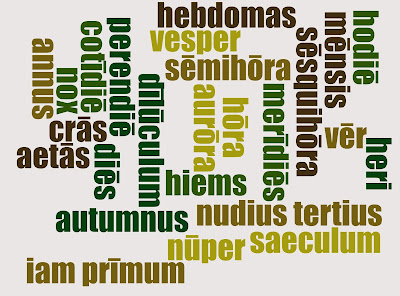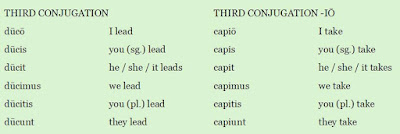Temporibus antīquīs portus celeber hīc erat, cui nōmen erat Portuī Rutupīnō; nāvēs ex Galliā in Britanniam nāvigantēs ad hunc portum plērumque applicābantur. Nam omnium portuum Britannicōrum hic optimus erat. Castellum in lītore portūs stābat. Intrā mūrōs castellī est ārea lāta. In mediā āreā fundāmentum aedificiī antīquī vidēs, quod fōrmam crucis habet. Hodiē "Crux Sānctī Augustīnī" vocātur, sed temporibus Rōmānīs fundāmentum phārī erat, ut cūstōs castellī affirmāvit. Sub hāc cruce est aedificium subterrāneum, quattuor et quadrāgintā passūs longum; quod intrāvimus. Cēreōs in manū tenēbāmus, quōs cūstōs dederat; nam locus obscūrus erat. Ab hōc aedificiō cunīculus, in fōrmam quadrātam excavātus, sub magnam partem āreae pertinet.
Dum per cunīculum ambulāmus, amita mea "Cui erat ūsuī hic cunīculus?" inquit.
Et cūstōs sīc respondet: "Piget mē quod dē ūsū cunīculī nihil affirmāre possum. Ūsuī fortasse erat, sī castellum obsīdēbātur: ecce puteus altus, ex quō aqua praebērī poterat."
Postquam haec spectāvimus, iterum circum mūrōs ambulāvimus. Dum ad dextrum cornū castellī stāmus, patruus meus nōbīs reliquiās amphitheātrī Rōmānī mōnstrāvit, quod nōn procul aberat. Magna multitūdō nummōrum Rōmānōrum in castellō servantur; ex quibus ūnum mihi cūstōs vēnumdedit. Tum cūstōdem valēre iubēmus, et ad cēnam properāmus.
Notes:
[1] Difference in the meaning of quod between the first two extracts, and the third:
[i] In mediā āreā fundāmentum aedificiī antīquī vidēs, quod fōrmam crucis habet │ In the middle of the open area you see the foundation of a building which has the form of a cross.
[ii] Patruus meus nōbīs reliquiās amphitheātrī Rōmānī mōnstrāvit, quod nōn procul aberat. │ My uncle showed us the remains of the Roman amphitheatre which was not far away.
[iii] Piget mē quod dē ūsū cunīculī nihil affirmāre possum. │ It annoys me ¦ that I can state nothing about the use of the tunne; see previous post
[2] Examples of the dative of the relative pronoun:
[i] portus celeber hīc erat, cui nōmen erat Portuī Rutupīnō │ There was a famous port here [literally: to which was the name] > which had the name Portus Rutupinus; note that the name of the port is in the dative case, and that will be explained in the next post with further examples
[ii] Cui erat ūsuī hic cunīculus? │ To whom was this tunnel of use?
[3] Connecting relatives
When we see forms of quī, quae and quod, the immediate translation which comes to mind is ‘who’ or ‘which’; in grammar this is known as a relative pronoun as it is referring back to a person / thing in the same sentence (the antecedent) i.e. they introduce a relative clause.
Tum in [i] silvās [antecedent] ¦ [ii] in quibus leō habitabat [relative clause] ¦ statim iter fēcit. │ Then he immediately travelled into the [i] forests ¦ [ii] in which the lion lived.
[i] Omnēs [antecedent] ¦ [ii] quī eam regiōnem incolēbant [relative clause] ¦ erant laetissimī │[i] Everyone ¦ [ii] who inhabited that region ¦ was very happy.
However, the relative pronouns quī etc. can also start a sentence referring to [a] a specific person or thing in the previous sentence or [b] the entire idea of the previous sentence.
The relative pronoun, therefore, is making a connection with the preceding sentence which is why, in grammar, it is known as a connecting relative.
In this position it is not translated as “who” or “which” but by a pronoun or demonstrative that refers to the antecedent.
(a)
[i] Caesar Rubicōnem trānsiit. [ii] Quī posterā diē adversus Rōmam profectus est. │ [i] Caesar crossed the Rubicon. On the next day [ii] he set out towards Rome.
It is common in translation to connect the two sentences with ‘and’:
Caesar crossed the Rubicon, and he set out towards Rome on the next day.
[i] Ancilla tandem advēnit. [ii] Quam ubi vīdī, laetissimus eram │ [i] The slave girl arrived. When I saw [ii] her, I was very happy, or The slave girl arrived, and when I saw her, I was very happy.
[i] Ille servus effugit. [ii] Quem posteā captum graviter pūnīvī. │ [i] That slave escaped, and afterwards, when he had been caught [ii] I punished him severely.
(b)
In the following examples, the connecting relative does not refer to a specific noun, but to the entire statement made in the preceding sentence:
[i] Canis equum adiūvit. [ii] Quod ubi vīdimus, mīrātī sumus │ The dog helped the horse. When we saw that, we were amazed, i.e. the connecting relative is not referring to the dog or to the horse, but to the whole event.
Similarly:
[i] Mīlitēs nostrī omnēs effūgērunt. [ii] Quod ubi vīdimus, laetissimī erāmus. │ [i] All our soldiers escaped. [ii] When we saw that, we were very happy.
Note in the next example the inclusion of verbīs to indicate that the connecting relative is referring to something that was heard.
[i] Victōria tandem Rōmae relāta est. [ii] Quibus verbīs audītīs omnēs gāvīsī sumus. │ [i] The victory was finally reported in Rome, [ii] and with these words having been heard [= and when these words had been heard, we all rejoiced.
[i] Pȳthia iussit eum ad urbem Tiryntha discēdere et ibi rēgī Eurystheō sēsē committere. │ Pythia commanded him to depart to the city of Tiryns and there commit / entrust himself to Eurystheus.
> [ii] Quae ubi audīvit, Herculēs ad illam urbem statim contendit │ and when he heard these things Hercules immediately hurried to that city.
In the Sonnenschein text, there are examples of this. Most of them could be translated as a relative clause like all the others, but the inclusion of the semi-colon in the text also invites the translation of a connecting relative.
[1] Sub hāc cruce est aedificium subterrāneum, quattuor et quadrāgintā passūs longum; quod intrāvimus.
Beneath this cross is an underground building, 44 yards long, …
The translation could continue as either [i] … which we entered, or [ii] … and we entered it
[2] Magna multitūdō nummōrum Rōmānōrum in castellō servantur; ex quibus ūnum mihi cūstōs vēnumdedit.
A very large number of Roman coins are kept in the castle …
The translation could continue as either [i] … one of which the guard sold to me, or [ii] … and the guard sold one of them to me
From earlier parts of this text:
[a]
… posteā autem ipse aegrōtāvit et Eburācī exspīrāvit. Quō annō quīnquāgintā mīlia Rōmānōrum ā Calēdonibus trucīdāta fuisse narrantur. │ … but afterwards he himself also died in York. And in that year 50,000 Romans are said to have been slaughtered by the Caledonians.
[b]
[1] Et Antōnīnus Pius … alterum vallum in ipsā Calēdoniā … aedificāvit: [2] cui nōmen hodiernum est Graham's Dyke.
[1] And Antoninus Pius built a second rampart in Caledonia itself …
[2] [i] literally: to which the name today is … > … which today has the name …; [ii] … and its name today is … / … and today it has the name …
[c]
[1] Itaque necesse fuit Hadriānō … magnum illud vallum … aedificāre; [2] cuius reliquiae hodiē spectantur.
[1] Therefore, it was necessary for Hadrian to build that large rampart
[2] [i] … the remains of which are seen today; [ii] and its remains are seen today
The key point is to translate the relative pronoun into a grammatically correct English structure i.e. Latin can begin a sentence with the equivalent of ‘which’, whereas English cannot.
He told me he was leaving. *Which* wasn’t true. Latin can express it that way, but it is incorrect in English.
> He told me he was leaving, and it wasn’t true. / He told me he was leaving, which wasn’t true.




















